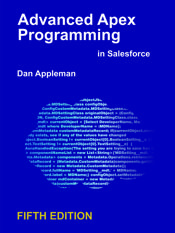by Dan | Oct 8, 2012 | General
I’m pleased to announce immediate availability of Kindle and Nook editions of Advanced Apex programming. The Kindle edition should also be available on Amazon.co.uk, Amazon.de, Amazon.it, Amazon.es and, as I understand it, to visitors from India on the main Amazon.com site.
This is the first technical book I published as an eBook, and I found the conversion process to be … interesting. The challenge related to code listings – how do you render listings in a format that can display in multiple resolutions on everything from a desktop to a smartphone? eBooks do support fixed fonts, but many do not support horizontal scrolling, and arbitrary wrapping of code can make it completely unreadable.
After some experimentation, I ended up including the listings as screen captured images from the Force.com IDE. This guaranteed consistent formatting, and allowed me to use a smaller font. It also allowed use of syntax coloring. There are tradeoffs to this approach – for one thing, the code is not text searchable. Use of color also makes the code a bit harder to read on older ePaper devices (like the original Kindles).
If you have a color Kindle or Nook, or one of the newer high-contrast e-paper readers, it should look very good. For older e-paper devices or smaller devices (like Smartphones), you’ll probably want to download the sample code to refer to as you read the book.
For the moment, the Kindle editions are not yet linked to the entries on the print edition on Amazon (that usually takes a few days).
You can find the latest links to purchase here.
by Dan | Sep 24, 2012 | General
I just came back from the Dreamforce conference with an epiphany – Force.com is the next Visual Basic. Some less experienced software developers might think that’s an insult, but those of us who have been around know that it’s not merely a compliment – it’s an observation that, if true, represents a potential tectonic shift to our industry.
To understand why, I need to take you back over 20 years.
When Visual Basic 1.0 came out (I participated in the original beta program), the reactions to the product fell into three categories:
- Most professional C++ programmers dismissed it. VB was a “toy language” or a “glue language” for components – not for serious software development.
- Increasing number of software engineers embraced the language because, to put it simply, when it came to desktop applications you could be an order of magnitude more productive in VB than in C++. It may not have had the stature and features of a “real” professional language, but it sure was profitable to work in it.
- VB was easy enough for anyone to use, so everyone did. Doctors, lawyers, students – millions of VB developers sprang up out of nowhere and wrote a lot of code. Much of it was very bad code, but that’s what happens when a bunch of amateurs get in the game. Entire book, magazine and training industries grew up to help them get better, and many of them did and built entire careers around the platform.
By the time VB6 came around, it was the most popular software development language and platform in the world. Simply because it was easy, and it was productive.
Why was it productive? Because VB put an abstraction layer over the Windows API that was infinitely easier to use than coding to the native API or other available frameworks such as MFC or ATL. You couldn’t do everything in VB6, but you could do most of what you needed, and could call the API directly if you really needed to. Having a rich set of available components to purchase didn’t hurt either.
Microsoft did a lot of things right building the VB community. They had great developer and ISV relations. They supported several conferences. There were books, documentation, whitepapers and so on. They really set the standard on how to build a platform.
Then they created the .NET framework.
There was a lot of negative reaction from the original VB6 community towards VB .NET, some calling it “VB .NOT” or VB.Fred (coined by Bill Vaughn). Some programmers made the transition. Some switched to C#. But two things were clear. First, VB .NET was indeed a powerful, serious, professional language and platform for software developers. Personally, I love it, and still use it all the time. But it was equally clear that VB .NET is not easy. In fact, the entire .NET framework is robust, powerful, sophisticated and complex. It’s a great platform for software developers, but is it a platform that makes it easy for non-programmers to write line of business applications? Not even close.
Both VB .NET and C# are native languages to the .NET framework – the Windows API of today’s software. Missing was the magic of the original VB – that layer of abstraction that made it easy for anyone to write software.
I’ve been searching for that magic for a long time. I kept waiting for it to appear out of nowhere the way VB 1.0 did. I sure didn’t expect it to sneak up on me from behind.
(more…)
by Dan | Sep 15, 2012 | General
Going to Dreamforce? Be sure to go to the Developer Keynote on Thursday at 3:00pm where Salesforce will be giving everyone who attends a free copy of “Advanced Apex Programming”!
Ok, it’s not free – you did pay for your Dreamforce pass, so technically it’s included in the conference cost, but you know what I mean.
You’re also welcome to come by any of my sessions, or developer theater talk.
… or stop by the Full Circle CRM booth (#125) where I’ll be most of the time when I’m not presenting or attending sessions.
by Dan | Sep 4, 2012 | General
I’ll be doing a presentation at the Developer Theater at Dreamforce at 10:00am on Thursday
Here’s the official description:
Real programmers use Apex
Salesforce has always been known for its powerful point-and-click customization tools. The “Clicks before Code” mantra expressed the idea that a wide variety of business processes and use cases could be solved using workflows, formulas and other non-programming techniques. But in truth, Force.com is a software development platform – as robust and powerful as frameworks like .NET or J2EE. As such, it’s no longer enough to know some language syntax and specific techniques. You need to think as a software architect, to be able to draw on multiple design patterns based on requirements and limits, and to consider lifecycle costs (and how to mitigate them in Force.com through good design, testing and diagnostics).
In this session you’ll meet Dan Appleman, the author of the new book “Advanced Apex Programming for Salesforce.com and Force.com” that builds on the existing Apex and Force.com documentation to help developers reach that next level. You’ll discover how (and why) a past Microsoft MVP and expert .NET developer ended up writing a major AppExchange package, and some of the surprising things he discovered along the way.
by Dan | Aug 23, 2012 | Design Patterns
The other day I saw a question on a forum in which it was noted that the following Apex code fails with a null exception error:
Boolean testVal = null;
if ( testVal )
System.debug( ‘Testval is true.’ );
else
System.debug( ‘Testval is false.’ );
This is somewhat unexpected in that in almost every other language, a null value in a Boolean variable is considered False.
In Apex, primitive variables always support a null value in addition to their expected values. Thus if you enter the following code into the developer console:
Integer i;
Boolean b;
Date d;
DateTime dt;
Decimal dl;
Double dbl;
Long l;
String s;
Time t;
system.debug(i==null);
system.debug(b==null);
system.debug(d==null);
system.debug(dt==null);
system.debug(dl==null);
system.debug(dbl==null);
system.debug(l==null);
system.debug(s==null);
system.debug(t==null);
You’ll see that they all come out as true. And if you try to access any method on the object, you’ll get a null reference exception.
Boolean variables in Apex are thus consistent with other primitive data types.
Where it gets interesting is when you look at how you might use a Boolean value in code.
Let’s say you have an uninitialized Boolean variable b;
if(b) … will fail with a null reference exception
if(!b)… will fail with a null reference exception
Fair enough, but now consider the following two statements:
Boolean b;
if(b!=true) system.debug(‘b is not true’);
if(b!=false) system.debug(‘b is not false’);
The result will be:
b is not true
b is not false
Well now, everyone knows that a real Boolean variable can’t be ‘not true’ (which is false) and ‘not false’ (which is true) at the same time.
Which means, to put it bluntly, that a Boolean variable in Apex is not really a true Boolean variable – at least as far as purists would be concerned.
Fortunately, I’m not much of a purist, so the real concern is what this means in practice.
First – always initialize your variables! This is especially true for those of you coming from .NET, which kindly initializes value type variables for you.
Second, test for null values where appropriate, even if you are using primitive data types.
Third, the safest comparison for Booleans is always against true – i.e. b == true or b != true. if you do this consistently, any null values that do sneak in will be treated as false. But does this mean you should always compare Booleans against True? Not necessarily – because you might want to catch those null reference exceptions to detect uninitialized variables or failures to check against null values.
It does mean you should never compare against false –
because in Apex b!= false doesn’t mean b is always true.

